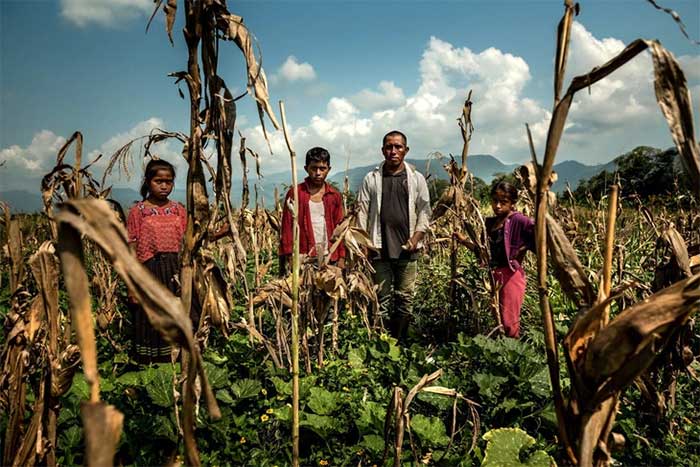A climate crisis has altered weather patterns, which could exacerbate crop failures in many agricultural regions around the world.
In a report published in the journal Nature Communications this week, researchers from the United States and Germany outlined how global food production areas are likely to experience crop failures and declining yields in the near future.
The researchers analyzed climate models and observational data from 1960-2014, then examined forecasts for the future from 2045-2099.

Carlos Tiul, an indigenous farmer in Guatemala suffering from corn crop failure, with his children – (Photo: THE NEW YORK TIMES)
By analyzing the data, they found that “jet streams” are changing global weather patterns, contributing to past crop failures.
However, many scientists have observed that climate change is altering the movement of these “jet streams.” This could challenge farming regions worldwide.
The research explains that in a high-emission scenario, a “strongly meandering jet stream” or a “wavy jet stream” could actually lead to lower crop yields globally.
Data showed researchers that years with “more than one jet stream” typically resulted in crop yields in the region dropping by up to 7%.
They also found that agricultural regions in Eastern Europe, East Asia, and North America are likely to be affected by these events.
Studying a heatwave that severely impacted agriculture in Russia in 2010, scientists noted that the high temperatures that year were linked to changes in the jet stream.
According to the UK Met Office, the heatwave in Russia destroyed 9 million hectares of crops, leading to droughts and wildfires. In July 2010, Moscow recorded 14,000 deaths, which was 5,000 more than in July 2009.
This is just one event related to changes in the “jet stream.”
The authors of the study warn: “The potential disruptive impacts have become more common and will further increase if greenhouse gas emissions are not mitigated.”
The world is unprepared for crop failures
Mr. Kai Kornhuber, the lead author of the study and a researcher at Columbia University, described the findings as a “wake-up call.”
He emphasized that instances of crop failure are underestimated, which may indicate inadequate preparation globally.
“We need to prepare for these complex climate risks in the future, and current models do not seem to capture that,” he stated in a press release.


















































